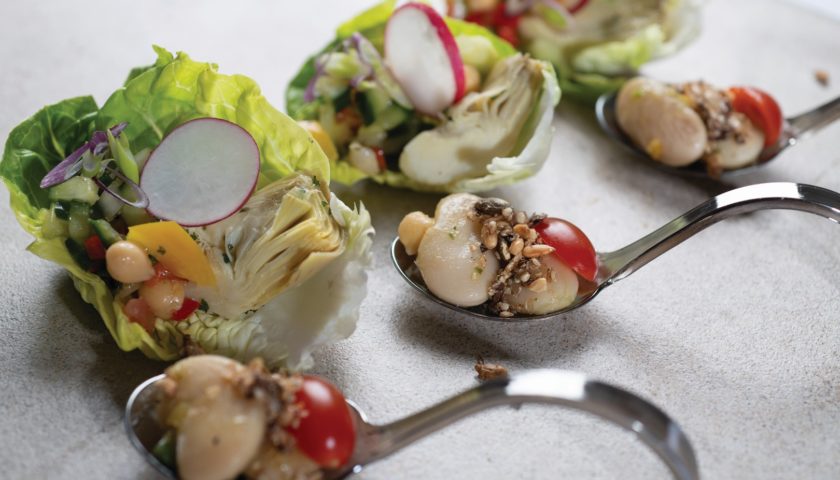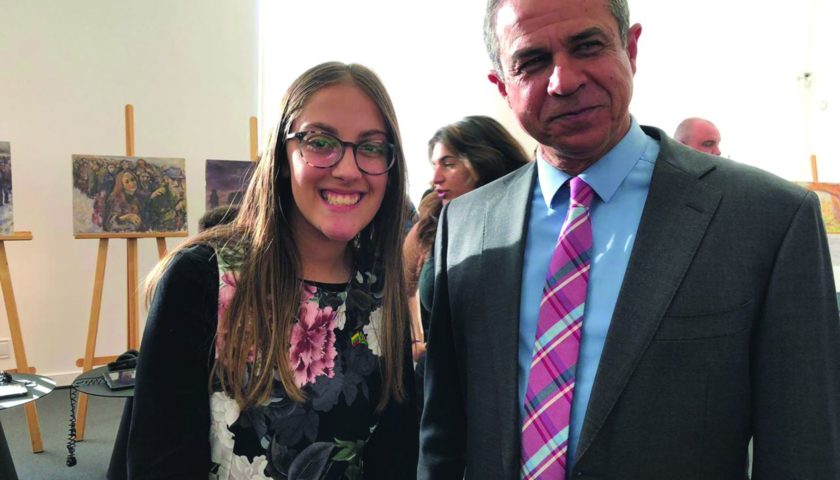They found fame and fortune, but realised they needed something more
By Chandrea Serebro
In her bright and airy flat in the heart of Jewish Glenhazel, Wanda Crouse is every bit as elegant as she was fifty years ago. She is a proud granny whose eyes glint with merely a hint of tension when she considers which of her grandchildren inherited her talents, something she is loath to pass on. Demure, few would guess that this articulate granny with a smack of the old English accent of her birth was once dubbed by the British press as Gladys Glitter for her musical and fashion sense reminiscent of popular glam rock singer Gary Glitter.
Or that once upon a time, clad in leopard print spandex, she graced the front of a vintage Swedish rock n roll playing card. A lady of many names, Wanda Crouse was born Wanda Teresa Arletowicz von Zelinska in Hackney, England to Polish parents, and came to South Africa with her mother and her father Ali, who was a well-known singer in Durban. “I attended a strict convent, and all the while I was singing with my father, yet none of the nuns knew.” At the age of 17, Wanda (known as Wanda Arletti), produced two albums (one with a girls group called ‘Going away with the girlfriends’ and one solo album called ‘Vanda’) and had her first hit in 1969 which was the result of much hard work.
“We used to fly up to Johannesburg to record, and it was long days and longer nights spent working on the music.” Soon, the Arlettis moved to Johannesburg, and Wanda and Ali spent their nights working at the Criterion Hotel performing, their names starting to spread across the music world. Wanda was invited to perform at Ndola Kitwe, Zambia/Zimbabwe in collaboration with a rock ‘n roll band of her choice, and it was then that Wanda discovered already famous South African Rock band The Stacattos (who made a major contribution to SA music with their hit version of ‘Cry to Me’ in 1968, which stayed at number one for over six months and earned The Stacattos three gold discs, a song Wanda did the background to).
After this, Wanda and her father connected with The Stacattos, professionally producing music together and personally too, with Wanda on the arm of guitarist Richard Crouse, with whom it was love at first sight and who would soon become her husband. But, it was when Wanda was approached by South African singer and producer Billy Forrest to record a song called Zanzibar – “a song which I thought was one of the silliest I had ever experienced in my life” that Wanda had her first really big hit. The ‘silly song’ shot straight to the top, reaching number two on the Hit Parade worldwide charts, and staying on the charts for 13 weeks.
Wanda might have reached stardom, but she says the stars never made it to her eyes. “Fame was not the life of glamour and glitz as told by international stars. The music industry was sincere hard work. There was no overnight success and certainly no wild life of drugs and alcohol. I worked supremely hard to get where we were at, and yet I was still just an ordinary girl, and making music was my job.” Wanda and the troupe would work from 10 am until after midnight every day, producing “hard rock ‘n roll”, even performing at less popular events held in Soweto (which was not popular or fashionable in Apartheid South Africa in the seventies).
“We were continually working on new material. We went from hair and makeup to costume, and rehearsals, and back. Working non-stop at the music, recording our songs.” Wanda still saw herself as just a normal person with a job. “Fame meant nothing to me.” Wanda recalls going for nice, Jewish family dinners at Richard’s house between sets at the hotel where she worked until midnight. “They were such a wonderful, close family, dynamic and tight-knit just the way I had been brought up.” In 1971 the two married, and three days later flew to Israel and Europe to travel. They landed up in London, with two suitcases and 300 pounds in their pockets and they began their life together.
One of Wanda’s gigs was as a contestant on a TV talent showcase. Although another contestant had been pre-selected to win, this stint won her a contract with record label EMI, and the recording began in earnest. “The music scene in London compared to South Africa was like comparing Rolls Royce to Volkswagen. Suddenly everybody began to make a big fuss of me, and they loved what they heard. I was 22, Richard was by my side throughout everything, and now we started to hit stardom.” Wanda recorded a lot at the holy grail of rock studios, Abbey Road, and soon began writing her own material.
Her song ‘Rock n Roll People’ started to take off and broke onto all the charts, even making it on to Top of the Pops – “no higher accolade in the music industry than this”. Yet Wanda never took in the gravity of how well they were doing at the time, still seeing it as a job, as hard work. After ‘Rock n Roll People’, Wanda Arletti became Bobby McGee, and her popularity only grew. Wanda joined with another band on tour, and that is when she began to see the truth behind the music industry.
“The band members would come in and line up their joints on the window sill, one up against the other. We used to pay the studio for rehearsals a week, and the studio owner would start at the beginning of the week rolling up a ten-pound note to sniff his cocaine, and by the end of the week he was down to a five-pound note. It was miserable. It was not what we knew, or what we held by.” Richard and Wanda found the music industry reckless, the artists desperate for the drugs to help them find the inspiration and energy to produce more and more work.
“They would send stretch Limos and Rolls Royces to fetch us from the hotels, fly us to Europe for TV shows. In Germany, I remember experiencing cold that took your breath away. I remember the Berlin wall, looking at the soldiers down on the other side. And the interviews and appearances. The interviews were back-to-back, it was hard work, and hard to manage.” Everybody was smoking, everybody was high. “Richard and I were like an innocent Hansel and Gretel in a scary forest.”
On the way back from a show in Amsterdam, Wanda recalls, as they sat in the minivan while the rest of their fellow musicians were getting sick from the excesses of the night, Wanda turned to Richard and said to him, “I can’t do this anymore. I won’t do this anymore.” Wanda found no satisfaction in the music, or the shows, or the interviews, in opening malls with her songs, or even kicking off major league football matches in London.
“The crazy things we did for publicity was amazing.” Having commitments to fulfil, with a whole team of people working behind the scenes to build up Wanda’s name, and with major competition from the only other female singer breaking out onto the hit parade, Suzy Quattro, the pressure was immense. When Wanda fell pregnant with her first child (her daughter, Jacqui), Wanda decided she was not prepared to continue. “Abbey Road and EMI hadn’t given up on me – they wanted more and more, and I recorded one of my best songs when I was eight months pregnant. But I realised this was not what I wanted out of my life, or for my children.”
Wanda gave it all up, in the face of disputing lawyers, broken contracts, and angry management – but she was firm with her resolve. She went on to have three more children in London, where Richard opened up a successful recording studio (which saw some major names through its doors, including Phil Collins), and they had everything that one would want out of life. They were not yet thirty, financially successful, with a lovely house, stable jobs, and children in private schools. But still, Wanda’s sense of emptiness pervaded despite all the trappings of the successful life she had built. Returning to South Africa when her father fell ill and subsequently passed away in the early 1980s, Wanda closed the final door on her career and began building a suburban life in Johannesburg.
“But still life was missing something. My children were going to Roman Catholic schools, and the school wanted to begin catechism classes with my eldest daughter.” But the concept of G-d as the father, the son, and the holy ghost didn’t resonate or even make sense to Wanda, and she began to question everything she had known.
Eventually, Wanda found a mentor in Rabbi Ben Isaacson, who helped her to understand the difference between Jewish and non-Jewish theology, and Wanda caused a stir among the nuns who “like penguins wanted my kids to wear crosses around their necks while I spoke of Moshe Rabbeinu”. Eventually, with the help of Rabbi Avraham Tanzer, Wanda enrolled her kids in a Jewish school and started to study Judaism. And in her Judaism, her subsequent conversion, and building a religious Jewish life with Richard and her six children, “everything fell into place”, and all those years of meaninglessness and emptiness, suddenly began to fill out.
“Finally, I felt that there was something bigger than me, and the more I learned, the more I wanted to know, and the more meaning I found in my life – which I had never known in the rock and roll business.” It became a calling for Wanda, finding solace in Jewish thought even after Richard passed away in 2006 and Wanda continued to find the “high” of Jewish study that no drugs, or fame, or fancy things could ever begin to have given her. It has kept Wanda level throughout her life, and even though her past does come back to her at times today, Wanda has no regrets.
“I sang from the age of 15. My voice was so well trained, and I knew that what I did was good. But I never needed the external validation of fame and fortune to make me feel whole. It was something deeper that did it for me and giving up the heady world of rock ‘n roll was the best thing I ever did. And I have never missed it since, not a day in my life.” At 71 years old, Wanda has never looked back, not even belting out a few lines in the shower or encouraging the grandchildren who show potential for talent. “You don’t need any external validation. The only advice I can give to people is to stay away from drugs. There is no fulfilment to be found there at all. When you connect to Hashem, that’s all you need, because you find fulfilment within yourself.”





